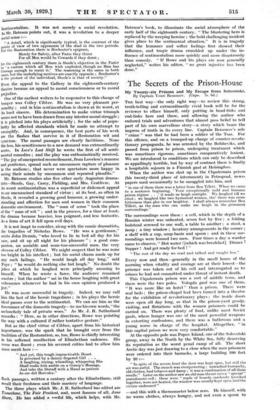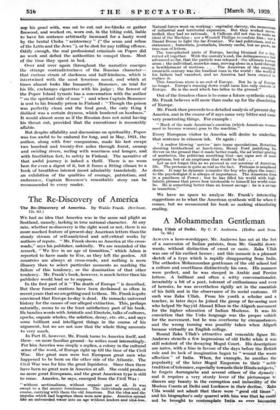The Secrets of the Prison-House
My Twenty-six Prisons and My Escape from Solovetskl.
By Captain Yonri Bersonov. (Cape. 7s. 6d.)
THE best way—the only right way—to review this strong, truth-telling and extraordinarily vivid book will be for the reviewer to efface himself, only putting in head-links and
end-links here and there, and allowing the author who endured trials and adventures that almost pass belief to tell part of his own marvellous story—a story which bears the impress of truth in its every line. Captain Bersonov's sole " crime " was that he had been a soldier of the Tsar. For this offence, and on a trumped-up charge of counter-revolu- tionary propaganda, he was arrested by the Bolsheviks, and passed from prison to prison, undergoing treatment which was sometimes rigorous, sometimes comparatively lenient.
We are introduced to conditions which can only be described as appallingly terrible, but by way of contrast there is finally a hospitable sojourn in a Finnish gaol at Helsingfors.
When the author was shut up in the Chpalernaia prison (his twenty-third place of internment) in Petrograd, news- papers used occasionally to be smuggled into him, and
" in one of them there was a letter from Ben Tillett. When we came to a sentence beginning, ' Your exceptionally mild and humane prison regime . . .' it made us laugh outright. We laughed till we cried ; we laughed like two hysterical women, tho' there was more bitterness than glee in our laughter. I shall always remember Ben Tillett, as the man who can make me laugh in the grimmest surroundings."
The surroundings were these : a cell, which in the depth of a Russian winter was unheated, seven feet by five ; a folding bedstead screwed to one wall, a table to another ; a stool, a lamp ; a tiny window ; lavatory arrangements in the corner ; a shelf with a cup, soup-basin and spoon ; and in these sur-
roundings were housed two men. Four times a day a warder came to observe, " Hot water ! [which was breakfast] Dinner Supper And get ready for bed ! "
" The rest of the day we read and talked and caught lice."
Every now and then—generally in the small hours of the morning when vitality and courage are at their lowest—the prisoner was taken out of his cell and interrogated as to crimes he had not committed under threat of instant death.
This Chpalernaia prison was a sort of middle term, and there were the two poles. Vologda gaol was one of them. " It was more like an hotel " than a prison. There were real beds ; the prison-chapel had been turned into a theatre for the exhibition of revolutionary plays ; the inside doors were open all day long, so that in the prison-yard gossip, visiting, and flirtations with the women prisoners could be carried on. There was plenty of food, unlike most Soviet gaols, where hunger was one of the most powerful weapons in extorting confessions, and there was a bathroom and a young nurse in charge of the hospital. Altogether, " in this capital prison we were very comfortable."
At the opposite pole was Popov Island, one of the Solovetski group, away in the North by the White Sea, fully deserving its reputation as the worst penal camp of all. The short Arctic day was just drawing to a close when the men prisoners were ordered into their barracks, a large building 100 feet by 20 :-
" In spite of the severe frost the door was kept open, but still the air was awful. The stench was overpowering ; unwashed humanity, old clothes, bad tobacco and damp ; it was a combination of all these smells." Later on the author saw an old man thrust into a " special " punishment-cell ; these were " made of boards carelessly knocked together, were not heated, the window was usually kept open,"and the victim undressed " —and this with a thermometer below zero. He himself, with no warm clothes, always hungry, and not even a spoon to sup his gruel with, was set to cut out ice-blocks or gather firewood, and worked on, worn out, in the biting cold, liable to have his sentence arbitrarily increased for a hasty word by the brutal Cheka " aristocracy " (" the scum and refuse of the Letts and the Jews "), or be shot for any trifling offence. Oddly enough, the real professional criminals on Popov did, no work and defied the authorities , to compel them. Most of the time they spent in bed.
Over and over again throughout the narrative emerges the strange contradictorineas of the Russian character—, that curious strain of slackness and half-kindness, which is intertwined with the most ferocious mood, and which at times almost looks like humanity. Bersonov, on trial for his life, exchanges cigarettes with his judge ; the fiercest of the Popov Island tyrants has a conversation with the author " on the spiritual side of man " ; and when Captain Bersonov is sent to his friendly prison in Finland : " Though the prison was perfectly clean and the food good, the only thing I disliked was a certain dryness, which bordered on hardness." It would almost seem as if the Russian does not mind having his throat cut, provided that the executioner is reasonably affable.
But despite affability and discussions on spirituality, Popov was too awful to be endured for long, and in May, 1921, the author, along with four companions, made his last escape two hundred and twenty-five miles through forest, swamp and swirling rivers, reeling with weariness and hunger, and with frostbitten feet, to safety in Finland. The narrative of that awful journey is indeed- a thrill. There is no room here for even a digest of it, but it forms a fitting climax to a book of breathless interest (most admirably translated). As an exhibition of the qualities of courage, patriotism, and endurance, Captain Bersonov's • remarkable story can be recommended to every reader.



















































 Previous page
Previous page